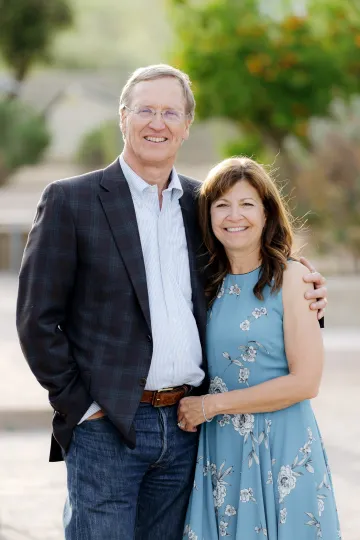Engineering Better Outcomes
One alumni couple gives to honor those who helped them and to create a brighter future for cancer patients.

The Hummel family
Photos provided by the Hummels
Mike ’82 and Sheri Hummel ’82 know the impact cancer can have on a person’s life.
Because of her family history, Sheri knew she was at high risk for breast cancer. That’s why, after reading an article on the topic in Arizona Alumni Magazine in 2006, she sought out the high-risk clinic offered by Setsuko Chambers, director of women’s cancers at the University of Arizona Cancer Center.
“I was always amazed how much time they would spend with me when I didn’t have cancer,” Sheri says. “I drove down and saw them the entire day."
After seeing Chambers and her team once a year for testing over 18 years, Sheri was diagnosed with very early stage breast cancer in 2021.
“I was told without those tests I would have gone another two years without a diagnosis. Now, I’m cancer free,” she says.
“In two more years, who knows what the treatment and outcome would have been. I don’t think it’s hyperbole to say that process might have saved her life,” Mike, her husband, says.
Inspired by their experience, wishing to help others mitigate cancer, and hoping to change the way the disease is fought, the Hummels have committed $5 million to benefit the Cancer Engineering Initiative, a collaboration between the College of Engineering and the Cancer Center. The initiative aims to create humanlike cancer models and growth environments to improve prevention, diagnosis and treatment.
“For part of our gift, we also wanted to support the high-risk clinic, as well as Dr. Chambers’ research at the College of Medicine – Tucson,” Mike says.
“We’re interested in helping to make fundamental changes in how cancer is detected, treated and understood,” Mike explains. “When we talked to Dean David Hahn about cancer engineering, we became excited to participate in a way that we hope really can make a lasting and long-term difference."

Mike and Sheri Hummel
The Hummels were high school sweethearts who grew up in Tucson. They laugh together over memories of competing against each other for better grades in English class, where they first met. They are Wildcats through and through, and their two sons — Ryan ’09 ’10 and Kevin ’10 ’14 — also graduated from the university, Ryan with degrees in civil engineering and Kevin from the College of Medicine – Tucson.
“Since the gift benefits both engineering and College of Medicine, it includes all four of us,” Sheri says.
Sheri earned her degree from the College of Education and worked as a first-grade teacher, while Mike’s background is in electrical engineering. In 2022 he was honored as the College of Engineering Alumnus of the Year.
“Engineering is really about solving problems,” he says. “To apply an engineering approach to solving the problem of cancer is both exciting and consistent with the way I approach issues.
This field is in its infancy, and a lot of work and resources will have to go toward making it successful — not just at the UA but nationally.”
Last year, the Hummels attended the Cancer Engineering Symposium, which brought experts together to share strategies and build community.
“We couldn’t help but be struck by how passionate people were, the ideas they had, and that it truly could be something that moves the ball forward when it comes to cancer diagnosis and treatment,” Mike says. “We wanted to do something to start that process, encourage additional funding and encourage people to participate in it.”
The Hummels describe themselves as fortunate to be in the position to give generously, and they credit their UArizona educations for the success they’ve seen in their careers.
“For us not to help others seems selfish and would represent a lost opportunity,” Mike says. “It seems a shame to not give back to the community that helped make you successful if you have the ability and capacity to. We believe strongly in that, and our children believe strongly in that.”
“We’ve had a lot of family and friends deal with cancer,” Sheri adds. “It’s been a part of my life since childhood. If we can do something to help in the future, we want to.”
